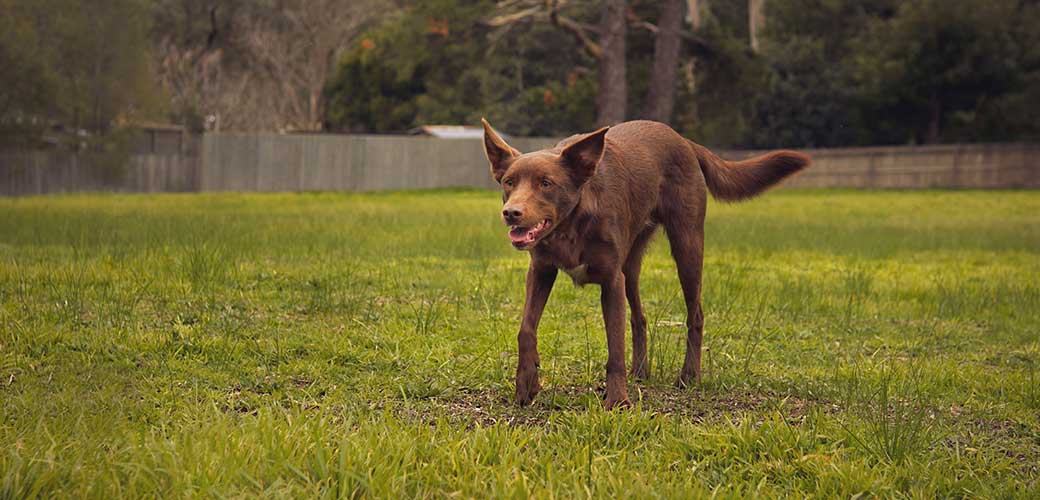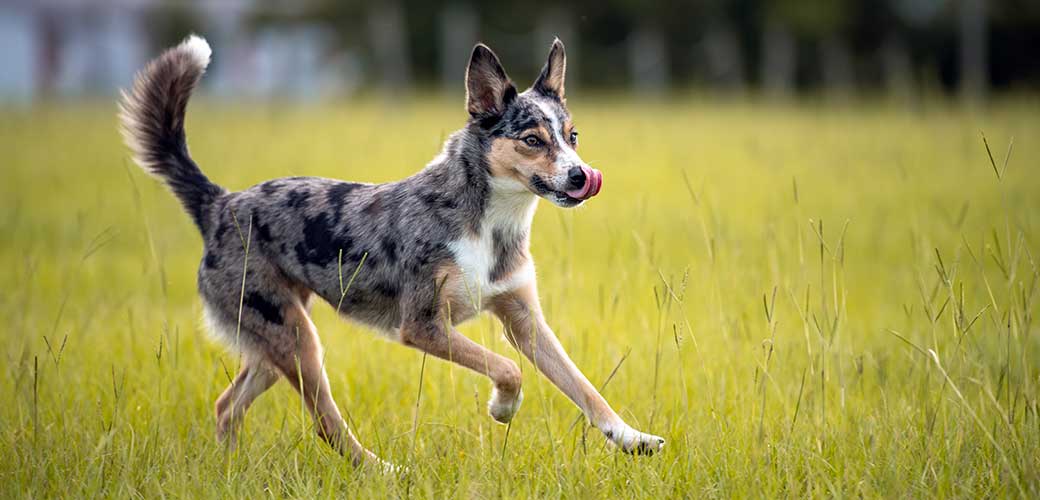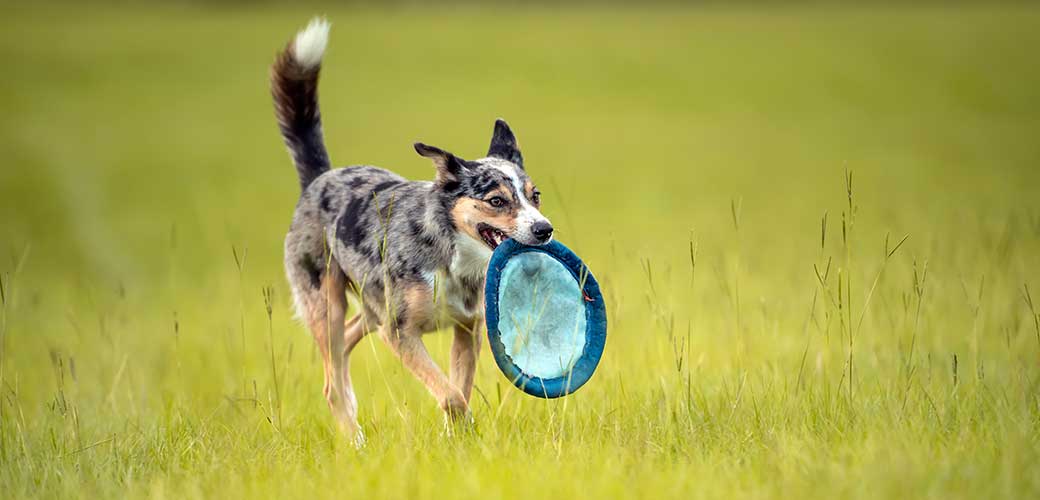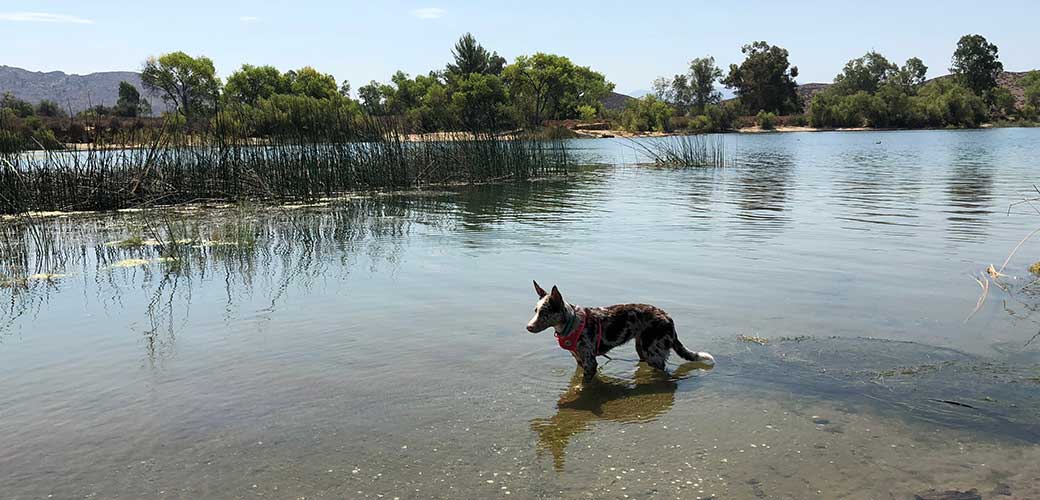This article will explore the Koolie dog breed and their characteristics and personality. We’ll also look at the best diet for your Australian cattle dog and discuss how much exercise they need daily. If you are looking to buy a working dog such as a Koolie, it’s essential to do your research as this energetic breed needs an active owner -this fun-loving breed needs lots of mental stimulation!
Koolie Breed Overview
- Weight: 15-22 kg
- Height: 13-24 inches
- Breed Group: herding
- Temperament: hard-working, energetic, intelligent,
- Suitable For: active owners, active families, farmers
- Other Names: German Koolie, Australian Koolie, Australian Kelpie, German Coolie, Welsh Heeler
- Average Lifespan: 12-18 years
A Short History of the Koolie Breed

A Koolie is a medium size Australian breed of dog with distinctive markings and an active temperament. This herding dog is said to be a result of crossbreeding a blue merle with a black and tan collie. Originating from England, early German settlers brought their English herding dogs to Australia (they were thought to have been brought to New South Wales), where they were eventually bred with other dogs such as the collie and Australian dingo. This earned them several names, including the German tiger dog.
Where does the name Koolie originate from?
There are many theories surrounding the origins of the name “Koolie” or German coolie, but it is said to originate from the fact that Germans rarely use the letter “c” in their language, and it was these settlers that predominately used this dog breed to work their stock. The “c” was changed to a “k” to avoid confusing the breed with “collie”. The Koolie dog is misrepresented as a German breed, whereas it is an Australian dog.
Koolie Breed Appearance

A Koolie is a double-coated breed with short, medium, or long coat lengths. The Koolie coat ranges from smooth and short (much like a Blue Merle/Original Blue Merle Collies) to medium or long like a border collie. The coat of a German collie can be smooth or coarse. Most owners prefer the shorter-haired breeds as they do not pick up grass seeds and are generally easier to care for.
A German Koolie can have a solid red, gray, black, or brown color with white markings or tan points/brown points if they have been bred with blue merles. Their coat is likely to be chocolate-colored with red markings if they have been bred with red merles. These working dogs usually have brown eyes but can also have black, yellow, blue, or mixed-colored eyes.
This medium-sized dog can grow up to 24 inches tall and have an average adult weight of up to 22kg. The size can, however, differ depending on where it is from. Generally speaking, the taller dogs are from the Queensland area and New South Wales, whereas the shorter, thicker varies tend to be bred in the Hunter Valley region.
Koolie Temperament
Australian Koolies have a wonderful temperament that is well suited to families. These working breeds are bursting with energy into their old age and are super intelligent. Like a border collie, the Koolie dog likes to be given tasks and is naturally enthusiastic.
These dog breeds are perfect for dog sports such as sheep trials as they display fine agility, stamina, and obedience but where these herding breeds excel is on the farm. As with other working breeds such as border collies, this working dog has been used by farmers and dairy farmers for years to herd cattle in the field.
The Koolie dog is renowned for being tolerant of other animals and people. The Koolie dog makes a perfect family pet, though they will need to be trained properly and socialized as their instinct is to round up animals, and these dogs can even display the need to herd family members!
How to Care for Your Koolie Dog
If you are thinking of choosing a Koolie dog over any other breeds, you will want to do your research first to ensure that you are prepared and ready. There are many different ways to care for your Koolie dog.
Keep reading to find out more…
Training and Exercising Your Koolie Dog

Koolie dogs are renowned for being active, intelligent dogs, and this working breed needs owners who can 100% keep up with them and exercise them adequately. These dogs have an unending appetite for exercise and play and will need several long walks a day to keep them satisfied – failing to do so could result in negative behaviors. Safe outdoor access is always recommended as a bored Koolie dog will likely become agitated and unhappy.
As well as regular walks, the occasional swim is always appreciated, wherever possible.
Ways to keep your Koolie occupied…
You’ll need a supply of toys to keep them occupied, too -the average chew toys will not suffice. An Australian Koolie needs challenging toys that will enable them to use their natural intelligence to solve puzzles. It is important to remember that these dogs need both physical and mental stimulation.
A strong breed…
Koolie dogs are strong-willed and require a consistent approach to training. This dog breed responds well to training and positive reinforcement. Training should begin young, so we always advise buying a Koolie puppy from a reputable breeder who adopts safe breeding practices – an average litter size should be around six.
Again, positive reinforcement is vital in the training of these dogs. Never shout or punish dogs for not listening. Treats generally work better!
Koolies have short attention spans; therefore, it is best to keep training sessions short and interesting – 3-5 sessions a day, around 5 minutes at a time, is recommended by some trainers.
What to Feed Your Koolie Dog
To keep your dog’s coat glossy and their body and mind fit and healthy, you must feed your Koolie dog a nutritious, balanced diet. Always buy top-quality dog food – dry food (kibbles) is recommended. This can be mixed with wet food or broth to ensure that they are adequately hydrated. Avoid sharing food with your dog.
Don’t share food with your Australian Koolie…
As much as it’s tempting to give them a little treat from your plate, this can cause mineral and vitamin deficiencies, give them dental issues and create picky eaters! To prevent obesity, your Koolie needs plenty of exercise and food suitable for their breed.
Common Health Issues with the Koolie Breed

As with many other dog breeds, the Koolie dog is prone to certain health issues due to having a small gene pool. Below, we have listed some of the most common health conditions:
- Merle Gene Abnormalities: dogs bred with the merle gene can suffer from numerous defects, including a smaller eye, off-center pupil, cataracts, blindness, and hearing loss. Reputable breeders will have merle testing before breeding.
- Joint Problems: this hardy breed can, unfortunately, suffer from joint problems, likely because they are so active and generally jump and twist more than other breeds.
- Skin Allergies: the Australian Koolie is not immune to skin allergies and can suffer from allergies caused by pesticides and herbicides.
- Hip Dysplasia: this is a common condition with dogs in general and can also affect Koolies. This condition is a deformity of the hip that usually occurs during growth.
Frequently Asked Questions:
Below, we have answered your most commonly asked questions regarding Koolie dogs.
Q: Is a Koolie the same as an Australian shepherd?
A: This working breed of dogs is similar in appearance, and a DNA test would show that they are indeed from the same family. The difference is that the Koolie originates from Australia, and the Australian shepherd originates from the united states. The Koolie is recognized by the Australian Sporting Registrar but not the Australian National Kennel Council, and their hard-working traits are heavily promoted by the Koolie Club of Australia.
Q: How much is a Koolie dog?
A: There are many factors to consider when buying or adopting a Koolie dog. Not only will you have to counter the price of the dog, but also living costs such as food, veterinarian treatment, toys, pet insurance, and more.
The average Koolie costs around $400-$600, and each dog has an average litter size of six puppies.
Q: Buy or adopt?
A: You should always buy from a reputable breeder. We recommend looking at the Koolie Club of Australia for professional advice on this breed.
Established in 2000, the Koolie Club of Australia offers fantastic advice on what to look for when buying a puppy from this breed. Alternatively, you can visit the Australian Koolie rescue. Koolie rescue will give you information on everything you need to know about Koolie adoption.
Q: Do Koolie dogs make good pets?
A: These dogs make excellent pets if you are willing to work with them! They are not for everyone as they are active dogs that require a lot of mental and physical stimulation. But for the right family, these intelligent dogs are hard-working and a joy to train. You can teach them numerous tricks, and if you work on a farm, then you can rest assured that they will be able to herd your stock like a pro. They also live generally healthy lives and can live up to 18 years old.
Q: How long do Koolie Dogs live?
A: The lifespan of a Koolie dog depends largely on how well they are cared for and if they have any health complications. Assuming the dog is healthy, they can live between 12-18 years old.
Q: Are Koolie dogs easy to train?
A: We recommend that you only get one of these dogs if you have previous experience as a dog owner or are willing to do lots of research into dog training. It’s not that these dogs need special training, but as we have previously mentioned, they are very active and intelligent and have a strong personalities.
Positive reinforcement, as opposed to reprimanding them, is a more favorable approach. Train your dog from a young age and ensure you socialize them as soon as they are ready.
Dog training requires consistency. Make sure you are firm but fair and only train your dog in short bursts as they can easily get bored!
Summary
This breed of dog has a distinct look that is beautiful. Whether bred with a blue or red merle, they display stunning colors, markings, and sometimes different colored eyes.
These dogs are dependable, hard-working, and intelligent. They like to be both physically and mentally stimulated, so toys and games that challenge them will keep them at their happiest.
The Australian Koolie is often used on farms as they are worker dogs with a wonderful, natural ability to herd stock. However, they make great family pets, too, as they have a gentle temperament and are not known to bark excessively.
We recommend buying your dog from a trusted breeder or rescue center. Never, ever use puppy farms as they are deeply unethical. Another reason to buy from a recommended breeder is that the dogs are more likely to be healthy and not have worrying health conditions that will generate large veterinarian bills but also cause distress to your four-legged friend.

